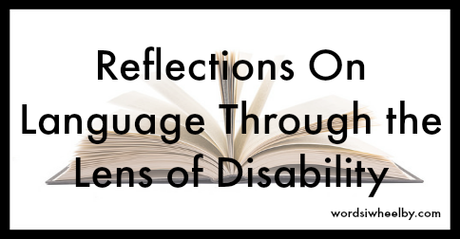
I'll explain what I mean with an example. Last night, I was listening to the audiobook version of Bird by Bird, written by Anne Lamott. It's a book on the art of writing, one I've been told is a must-read time and again. I found myself taken by the words, pulled in by the deeply human and incredibly poignant air of Lamott's stories and advice. Then, a line stopped me in my tracks. Lamott shares what she tells her students when they ask her how to sit down to begin writing:
"You put a piece of paper in the typewriter, or you turn on the computer and bring up the right file, and then you stare at it for an hour or so. You begin rocking, just a little at first, and then like a huge autistic child. You look at the ceiling, and over at the clock, yawn, and stare at the paper again."
I had to go back and listen to the words again. I Googled the quote, reading it over and over. I was troubled by the use of autism as an analogy for a writer's struggle. Why was it necessary to use the term "huge autistic child" when surely a writer as skilled as Lamott could have used another comparison to convey the same idea?
This moment of pause happens to me nearly every time I encounter a reference to disability. I search for the meaning behind what was said. My mind runs through a checklist:
- Is the language discriminatory?
- Who might be hurt by it?
- Why did the person write or say what they did?
- How could the language be changed?
- Does the language actually need to be changed?
I've basically trained myself to think this way. It's become my gut reaction, this hyper-focus on how disability is portrayed. (Case in point: My first ever blog post was about the problems with the popular saying "There is no elevator to success. You have to take the stairs.") And this is important. There are far too many times when language can be downright offensive or a total misrepresentation of disability. But language is rarely ever a clear cut matter. On the one hand, casually mocking disability is a practice still far too ingrained in our culture. On the other, I definitely can't always assume ill intent because I know most people mean no harm.
The same goes for when discrimination is unspoken or subliminal. This morning, I was reading "15 tips for public speaking that apply to shining at work, and just about everywhere else" by Danielle LaPorte (because I've got some public speaking gigs approaching and I'm always up for more. Shameless plug). All of the tips were valuable and full of insight, but again, I found myself hung up on one line:
"High heels are a must. Because, it's not how you feel, it's how you tower."
My first response was "Hey, what about me?!" I use a wheelchair, and I can't stand up at all, let alone in high heels, to tower over someone, but that doesn't mean I can't command attention from a room while sitting down. The thing is, though, that I know that negative intentions were the furthest thing from LaPorte's mind. She was trying to give advice, not trying to insult disabled people. But the reality is that disabled people are the world's largest minority. There are approximately 1 billion of us. So, the fact that disability still hardly crosses mainstream consciousness can be tough to swallow, especially when I'm reminded of that almost everywhere, every day.
That being said, in the case of what Lamott wrote, the word choice was poor, but I see it was not meant to be cruel. And in the case of LaPorte, there was clearly a lack of awareness of the implication of her words, but again, it was not meant to be cruel. For both, I was still able to take away valuable messages, disability issues aside.
This makes me think: can there ever be a time where I can take words as they are, and not be concerned about the deeper meaning? I am certainly not ever willing to accept the use of downright insensitive, hurtful, or attacking language. (Like the "R"-word. If you use it, just...don't.) But when can I take something at face value without feeling guilty about it?
It's become instinctual for me to view everything through the lens of disability and activism. And that's okay. It's human. The work we do and the lives we live inevitably shape our worldview. But I'm learning not to let my worldview become too clouded, because even as we push through the fight for equality and acceptance (and as much as I wish this wasn't an issue to begin with), I believe there's joy to be found in things that are, with some unfortunate exceptions, beautiful or elegant or lovely - without fear that we're not being responsible activists by appreciating something for the good it can still bring to our world.
What's your take? How does your life shape your perceptions of the world around you?
